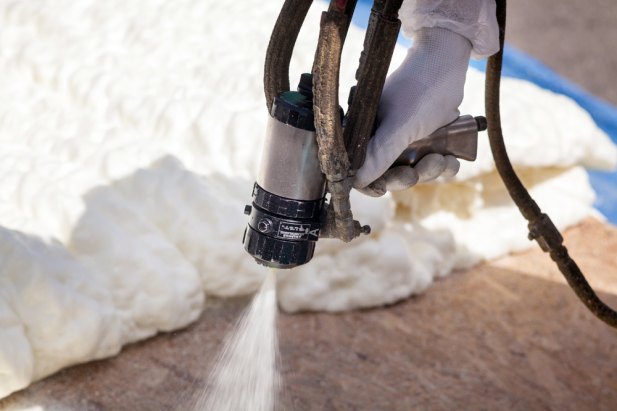
This vs that: spray foam or rigid foam insulation
When you’re ready to make a choice about the type of insulation to use in your commercial construction project, it’s good to know you have a number of options, each with its own benefits and potential shortfalls. Making an informed decision requires knowing a bit of background about each option, how it works, how it’s installed and how effective it is at insulating your building.
To help you find the choice that is right for you and your commercial construction project, let’s examine and compare spray foam versus rigid foam insulation.
Comparing spray foam and rigid foam for commercial construction projects
Spray foam insulation: the pros and cons
Pros
- When properly applied, spray foam adheres to the surfaces where it is sprayed, filling any gaps and providing more complete coverage. Spray foam also stays in place because it adheres to the structure; there should be no settling of the product over time when applied correctly.
- Spray foam is mold and mildew resistant. Because it adheres to the building structures, it restricts airflow out of or into the building. As a result, the formation of condensation is prevented, making it less likely that mold and mildew will form.
- Spray foam has the highest R-Value of any other form of insulation, which can reduce energy costs, sometimes significantly, over other insulation choices.
Cons
- Spray foam tends to be a more expensive choice for insulation. In fact, experts say the cost of spray insulation can be up to three times the cost of other insulation choices.
- The effectiveness of the spray foam can boil down to who you choose to professionally install the product. Spray foam that isn’t thick enough, isn’t applied to gaps or is inconsistently applied and doesn’t have a uniform thickness, can lead to unsatisfactory results, according to, “4 Pitfalls of Spray Foam Insulation,” on www.energyvanguard.com.
Rigid foam insulation pros and cons
Pros
- Rigid foam has a high R-Value, though not as high as spray foam.
- Rigid foam insulation comes at a lower cost than spray foam insulation.
- Because of how it is installed and its structure, rigid foam can contribute to the strength of your walls.
Cons
- Rigid foam insulation can be less efficient if a crack goes unprotected. The result is potentially higher energy costs. Additionally, rigid foam does not expand to fill gaps, so air and moisture leaks are more common.
- Rigid foam installation requirements may be limiting as it must be installed on an exposed, open wall. If you are remodeling existing construction, you will have to remove all existing insulation and drywall.
Find the right insulation for your commercial construction
Informing yourself so that you can find the right insulation for your commercial construction project is an important step in shoring up the long-term success of your venture. So whether the cost-effectiveness of rigid foam insulation appeals to you, or the high R-Value, mildew resistance and flexibility of spray foam insulation, you’ll know the potential shortcomings to expect, as well as the benefits of the insulation you choose.